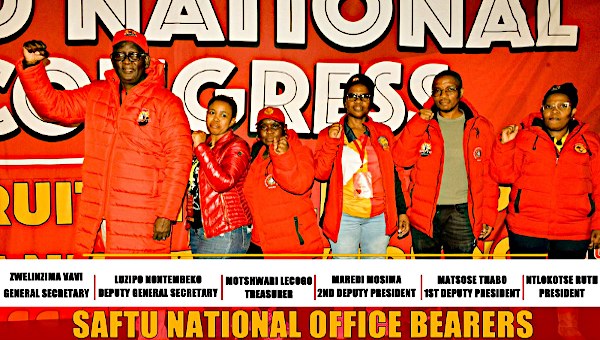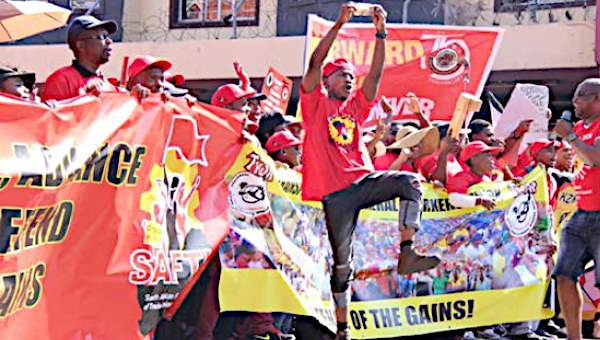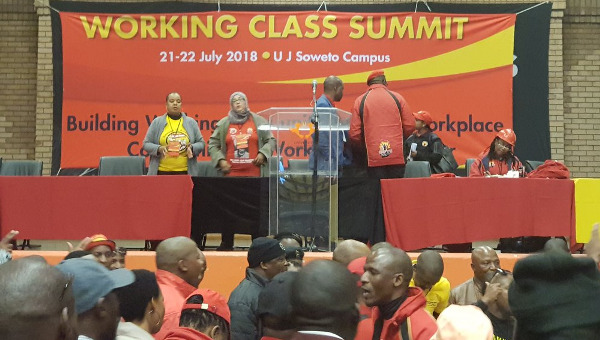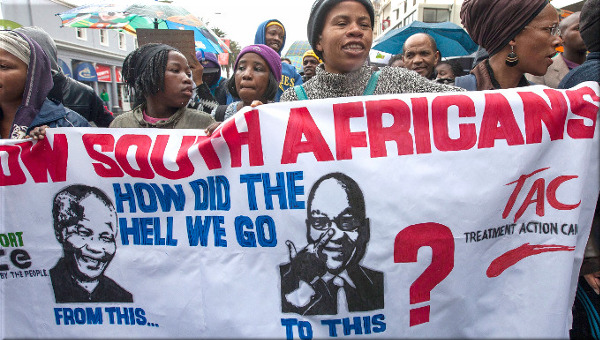The following speech by Zwelinzima Vavi, General Secretary of the newly formed South African Federation of Trade Unions (SAFTU), was delivered in New Orleans at the 46th International Convention of the Coalition of Black Trade Unionists (CBTU) a few days ago.
Greetings to my brother and comrade, President of the Coalition of Black Trade Unionists (CBTU), Rev. Terrence L. Melvin. Revolutionary salutes to my big brother Bill William Lucy, the former President of CBTU and leading member of the AFL-CIO and AFSCME now trying to enjoy his well deserved retirement.
Good morning to all of you my dearest sisters, brothers and comrades gathered here in this historic 46th International Convention of the CBTU. Let me not forget to also give special greetings to all of your distinguished guests.
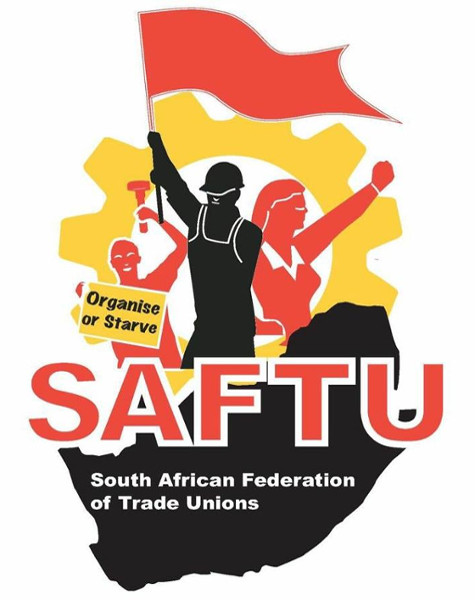 I must confess from the outset, that I am not exactly a stranger to the CBTU convention! I have had the great pleasure of being with you before and I am a very proud recipient of an award from your good selves in recognition of my humble contribution to the struggle to improve the lives of working people in my country and beyond.
I must confess from the outset, that I am not exactly a stranger to the CBTU convention! I have had the great pleasure of being with you before and I am a very proud recipient of an award from your good selves in recognition of my humble contribution to the struggle to improve the lives of working people in my country and beyond.
Can I just say at this point, that asking a recipient of one of your prestigious awards to return and report back on developments seems to me to be a very powerful thing to do. Firstly, it provides an opportunity to update friends and comrades on developments that have occurred over the last period since we were together. Reporting back is also a fundamental element of building a democratic culture. Secondly, it provides an opportunity for us to share what we have learned as the struggle for emancipation unfolds. In these challenging times, we have to keep talking and learning from one another, to think critically about how best we can move forward. Finally, and perhaps most importantly, reporting back provides an opportunity to assess whether the beliefs we held dear when we were younger are still relevant today, and are still capable of guiding our actions for the project to liberate the working class and the whole of society from the yoke of oppression.
Amongst Comrades
Looking around this room today, I can confidently say that I am amongst comrades who still hold true to their principles. Comrades who are still fighting the good fight against all forms of oppression, and comrades who are determined to see real change, and not just window dressing or a compromised illusion of change. For these reasons, I have to say, that I feel very at home amongst you and thank you sincerely.
Can I ask that all of you please come home with me to South Africa soon? Comrades, we need each other!
In terms of providing an update on developments in South Africa, many of you may not have followed the dramatic events that have taken place there. Last time I was here I was introduced as the General Secretary of the Congress of South African Trade Unions (COSATU), and now I am being introduced as the General Secretary of the South African Federation of Trade Unions (SAFTU). You may well ask, how has this come about?
I cannot answer that question adequately without taking a few more minutes than my allotted time, and I am pleased therefore to report that I have successfully negotiated a little extra time to explain the tragedy taking place in my beloved country.
I am doing so because you deserve to know. The CBTU played a key role in coordinating solidarity not only for COSATU but for the ANC and the liberation movement as a whole. I remember so vividly when you came to observe the first democratic elections held on the 27 April 1994, and that produced the first president of the New Democratic Republic of South Africa. Some of you stayed on until Comrade Nelson Mandela was inaugurated on the 10 May 1994. We shared tears of joy, and were full of hope that the liberation of South Africa was on hand, and that our common struggle against injustice, dating back to the horrendous enslavement of our fore-mothers and fathers through forms of utterly barbaric forms of colonialization of our shared motherland of Africa, was now to be finally challenged, and its evil legacies uprooted and in a new chapter of liberation.
This was clearly one of the proudest moments, not only for us who live in Africa, but for all of our sisters and brothers of the African diaspora everywhere including here in the United States. The defeat of the apartheid system represented a triumph of the human spirit against evil. The liberation of South African we hoped, would unleash a new beginning not only for Africa, but for the marginalized everywhere. A new beginning to close the widening gap between the so-called developed North and the chronically under developed South, but also to encourage and inspire the struggle to end inequality within each of our countries, including here in the city of New Orleans!
Progressive forces acknowledged that South Africa was amongst the last countries to be liberated in Africa and therefore had the advantage of witnessing and learning from the great liberation movements in Africa and other parts of the world, in the hope that it would ensure that it did not succumb to the trappings of power, corruption, and the self aggrandizement of leaders at the expense of the poor and real social change. Comrades like Chris Hani identified the possibility at an early stage, and typically and courageously spoke out before his untimely departure. We now know, from our own experience, that Comrade Chris Hani, and so many others who made the ultimate sacrifice, must be turning-over in their graves at what they see happening in the name of emancipation.
A Dream Betrayed
So what happened? How has that inspiring dream been stolen and betrayed? Let me try and provide some food for thought on these matters. The generation of leaders of which I was a part committed a grave mistake in 2005, when we defended a man compromised by allegations of corruption, and whose key financial advisor took the fall at that stage and was given a 15 year jail sentence.
We continued to support, and elevate a man who is now facing 783 counts of corruption, fraud, money laundering and racketeering charges, and helped usher him in to the highest office of our land, as the President of both the liberation movement, the ANC and of our new democratic country, under a Constitution that embedded many of the freedoms we had hitherto been denied.
Many ask the question… how did we commit such a blunder? There is no other way of explaining this except to admit that we were blinded by the hatred of the pro-business neoliberal policies that were advanced by the former President of the ANC, Thabo Mbeki, and so much so that we stopped thinking with our heads, rather than our hearts!
When the opportunity arose to remove Thabo Mbeki in the ANC National Conference held in 2007, we had no qualms in forming a broad coalition of the wounded to install Jacob Zuma who we solemnly believed would represent the aspirations of workers and the marginalized in our society.
Some of us realized within the first few months after he was elevated to the position of the President that we had committed a grave error! We started to raise concerns initially very privately and later more publicly about the direction the country was taking under his leadership. We raised the alarm as early as March 2010 when it was clear that he was taking us on a route not just to a deepening of neoliberalism, but also toward a Kleptocracy. Could we have stopped this earlier? Perhaps, but I am sorry to report that removing one person now, will be totally inadequate. The damage has been done. The rot has gone too deep and too wild to be removed by just removing one person.
Jacob Zuma was until very recently, working hand in glove with the leaders of the so called South African Communist Party (SACP), who meticulously invested everything to winning individual leaders of key unions and other structures through patronage, to dash the hopes of a truly democratic and liberated South Africa. COSATU which was celebrated by you and other unionists across the globe as the only reliable force that combined a powerful class analysis with an ability to mobilize practical solidarity, and not just for South African workers, but also our friends in Zimbabwe, Swaziland, Cuba, Palestine, Western Sahara, and many more countries.
By 2011 divisions on the way forward were entrenched but still under wraps and not so obvious to outsiders. These divisions played themselves out during the 11th National Congress held in 2012. Bill Lucy was amongst those present at that congress. A group of union leaders representing their own agendas without a mandate, had grown increasingly uncomfortable with the General Secretary of COSATU. They together with the leaders of the ANC and South African Communist Party launched a scathing attack on the Secretariat Report which they had previously endorsed, which had been drafted in partnership with them, but that clearly upset their political minders. The report was presented to the Congress by myself, as the General Secretary as is customary.
The very same leaders who had once endorsed the report, now felt that the report was too candid about the ANC government failures to deliver to the working class, and was too frank about the weaknesses of the Federation, and its affiliated unions. This congress took place after the Marikana massacre where 34 workers lost their lives after embarking on an unprotected strike demanding a R12500 minimum wage. Congress was also preceded by another wildcat strike where thousands of farm workers took to the streets to demand R150 an hour against a R60 to R80 they were being paid.
When these leaders failed abysmally to persuade their own members why the General Secretary must be removed they vowed first privately, and then publicly that they will use the smaller structures where they had power and a slight majority to pursue the objectives they could not win at National Congress.
Indeed they wasted no time. Immediately after the Congress, which gave a resounding endorsement of the General Secretary and the radical policies contained in the Report, and then launched an unprecedented and unattributed attack in the media against the General Secretary. They made vitriolic allegations that the General Secretary was corrupt, and acting outside of a mandate, despite what the Congress had agreed.
These attacks included circulating a bogus intelligence report that has now been wholly discredited that accused the General Secretary of being an agent of imperialism, especially American imperialism! I hope I do not have to reassure you here that I have never worked for the CIA or any other intelligence service!
When a CEC asked two prominent individuals with historic links to the unions to probe all these allegations the accusers simply refused to cooperate and accelerated their vitriol through the media. The founding Assistant General Secretary of COSATU pulled together a small group to coordinate a unity intervention, but this too failed because they were not interested in unity but were hell bent on “surgically removing” as they described it themselves, the National Union of Metalworkers of South Africa (NUMSA) and the COSATU General Secretary from COSATU.
Even when a task team was established by the ANC, led by its Deputy President, Cyril Ramaphosa to bring about unity and cohesion, they ignored its appeals and essentially boycotted the proceedings. The leaders of the pro-Zuma faction inside COSATU were so compromised and enjoyed the support of the dominant ANC faction led by the ANC President, Jacob Zuma, and the whole-hearted support of the so called Communist Party led by its General Secretary Blade Nzimande.
Expelling NUMSA
On the 8th of November 2014, 34 members of the COSATU leadership without a mandate, pushed through a vote to expel 340,000 members of NUMSA from
the Federation which they had been so instrumental in building. A federation that was so loved by metalworkers! The dominant faction eventually totally frustrated a renewed ANC intervention and turned their backs on a third of a million workers at a time when working class unity was of paramount importance. The COSATU General Secretary was himself expelled on the 30 March 2015 for refusing to support this undemocratic and draconian decision.
It is worth adding here that NUMSA did everything it could to remain in COSATU. Comrades must read the document that was submitted by NUMSA in defense of its right to be critical of ANC policies, and to simply discuss whether or not it would be endorsing the ANC at the next election. NUMSA painstakingly refuted every accusation leveled against it, including that it poached members from other unions. NUMSA pointed out that under conditions of globalization and ever expanding value chains as a result of the restructuring of domestic and international Capital, union organizing scopes were being redrawn. NUMSA even proposed a way forward for ensuring that cooperation and not competition between affiliates be the order of the day. Despite all of this, they were recklessly expelled, to the detriment of COSATU, and it has to be said the wider working class. With NUMSA and the General Secretary out of the way, the dominant COSATU/SACP faction was free to imprison the movement in a series of class compromises that continue to paralyse it today.
In a parallel development, those progressive elements who remained in COSATU and who argued for a more tolerant and inclusive political culture were isolated and attacked from within. Several unions that had a long and noble tradition of independence, militancy, internal democracy and accountability were targeted by the dominant faction, and were encouraged to deal with dissent within their own ranks. To their eternal shame, some of the most historically inspiring unions were transformed almost overnight into little more than lap dogs for the ruling party, and especially the faction that promised patronage! When corruption as a result, was exposed on a grand scale by activists within these unions, they were summarily dismissed, abused and subjected to treatment more befitting gangsterism than trade unionism. Worker leaders were shot and killed for daring to demand forensic audits, and accountability. This is the reality of what we had to face in those troubling times, and I dare say that most of you here did not hear about this at the time. Never again must workers suffer in silence on the alter of political expediency.
What this meant in effect, is that hundreds of thousands of workers were now without a home, and I shall return to their new homecoming shortly.
Whilst this tragedy was unfolding inside COSATU there was a larger crisis happening in the country and inside the ANC itself. The ANC youth structure were also targeted for domestication leading to the expulsion of its President, Julius Malema and the disbandment of all structures. The ANC women structure too did not escape so did other provincial leaders seen to be not supporting the rampant corruption that had become the feature of the Jacob Zuma presidency. Before we know it the ANC itself had become so factionalized, so divided and so weakened that in the last Local Government election it lost three major metros, Johannesburg, Pretoria/Tshwane and Port Elizabeth/Nelson Mandela.
Let me go back to this programme which is implemented with military precision to domesticate and hollow out not only the organs of people’s power but key institutions that support our constitutional democracy and the state owned enterprises. This was done through a combination of abusing a revolutionary concept of cadre deployment in key strategic institutions or an outright undermining and discrediting institutions that could not be controlled including such institutions as the office of the Public Protector and the Judiciary.
This whole project to hollow out institutions had only one aim which is the enforcement of the project to create a predatory state whose only reason for existence will be to accumulate and plunder the country’s resources for the benefit of family members of Jacob Zuma as the matrimonial of this era but the networks of greedy corrupt other families benefiting from this crony capitalism.
Whilst all this was unfolding the material conditions of the workers and Black people were worsening.
- 35.6 per cent of the population of working age is unemployed, if we include those who have stopped looking for work. Thousands more jobs losses are expected to be lost
- A growing number of the remaining jobs are insecure and low-paid, as casualization and exploitation by labour brokers continue unabated, creating a growing army of vulnerable and powerless workers. Many employers are trying to sabotage collective bargaining and drive down wages to the lowest level which desperate workers are prepared to accept.
- The richest 1 per cent of the population has 42 per cent of the country’s wealth; the wealth of South Africa’s top 10% grew 64% in first 17 years after 1994, whereas the wealth of the poorest 10% did not grow at all in real terms. This has made us the most unequal society in the world.
- The economy is still dominated by monopolies owned by a still mainly white and male capitalist class, which uses the wealth created by workers’ labour to enrich themselves. Another section of their class, and their cronies in the public service, has become a predatory elite of thieves, turning our country into a kleptocracy where public funds are corruptly stolen to enrich a greedy few.
- There is chaos and corruption in numerous state-owned enterprises, including Eskom, SAA, Prasa, PetroSA and Transnet.
- The economy has been down-graded to junk status. Government ministers behind today’s political and economic carnage have tried to downplay the impact of being placed on a junk status. One truth that can’t be disputed is that they as individuals will hardly be affected, but the workers who have been in a junk status for 500 years can’t afford worsening of the current crisis.
- The ruling ANC is paralysed and divided into factions, hiding behind empty words about radical economic transformation while continuing with the neoliberal economic policies which are further entrenching the power and wealth of the monopoly capitalists and taking us further from the ideals of the historic mission.
All these problems, as always, affect the working class and the poor the most. Yet existing union federations, which ought to be leading a fightback are failing abysmally. This was most starkly exposed when they agreed with government and business to an insulting R3,500 or about $269 a month or about $1.60 an hour minimum wage, which will do nothing to lift workers and their families from their present poverty.
Faced with the reality that COSATU has been totally captured by the ANC politics of divisions, we only as a very last resort created a New Federation. History was made when the South African Federation of Trade Unions (SAFTU) was launched on 21-23 April 2017 and it has already made a big impact on the country’s political and labour landscape.
With 700,000 members from 24 unions, SAFTU is already the second biggest workers’ federation after COSATU; and nearly 20 other unions have
already shown interest in affiliating; some are just waiting for a mandate from their structures.
The pathetic plight of the once mighty COSATU could not have been better illustrated than the recent fiasco where they were forced to end their rally on the most important day of the workers’ year, May Day, when they had to scuttle from the stage without uttering a word, as their own members demanded that President Zuma must go.
At exactly the same time SAFTU members were marching in their thousands in the streets of Durban. As one federation was dying a new one was springing to life.
This is the price the COSATU leadership – and more importantly their working-class members – are having to pay for the leadership becoming an appendage of the ruling ANC and getting embroiled in its bitter factional fights, in which neither side stands up for the workers but both represent different factions of neoliberalism and capitalist exploitation that has created the current and worsening material conditions of the working class.
When NUMSA pointed out the dangers of COSATU locking itself into a subservient relationship with the ruling party and government they were expelled. COSATU refuses to acknowledge that both the ANC factions may we add together with the SACP and COSATU itself have long been captured by the white monopoly capital they purport to be fighting. The current neoliberal and austerity programme is the trophy that capital has secured. COSATU seeks to replace a butcher of the working class with another one. COSATU is trying to serve the master and the slave at the same time, hence it is now imploding, disintegrating and toothless.
Challenge Facing SAFTU
The immense challenge now facing SAFTU is to revive the hopes of the working class, build a vibrant, independent, and democratic workers’
movement, and take up the struggle for the total emancipation of the working class from the chains of its capitalist oppressors.
It must prioritize recruitment of the three quarters of workers who are not in any trade union but are generally the most vulnerable, and marginalized workers who have the greatest need of a trade union.
To achieve all this the launching Congress committed itself to a set of basic principles, which include:
- Independence from both employers (in the private and public sector) and political parties, though this does not mean that unions are apolitical. We shall campaign on policies in the interests of the working class and the poor. Congress has already identified key ares for campaigning, including saving jobs, fighting for free education, the national health insurance scheme, land to be restored to the people, the end to abuse of farm workers, defense of collective bargaining and the nationalization of the banks in particular the Reserve Bank, the mineral wealth and key industrial monopolies.
- Affiliated unions will be worker-controlled and based on democracy, accountability and transparency, with an insistence on mandates from, and reporting back to, the membership in order to unite workers by democratic means and not by dictatorship from the top.
- Fighting SAFTU for the maximum unity of all workers and rejecting all divisive and negative sentiments such as racism, xenophobia, tribalism and ethnicity, all of which are the product of the capitalist system which exploits divisions within the working class. We shall welcome and recruit migrant workers.
- Financial self-sufficiency and accountability, and opposition, in word and deed, to business unionism, corruption, fraud and maladministration within our own ranks.
- A high priority on international solidarity with workers in struggle.
We are determined that these principles must not just be slogans, but a guide to action. Time is not on our side. If workers cannot turn the
tide and fight back against their appalling conditions of life, we shall slide into a new age of barbarism, exploitation of the working class and the poor.
We need your support comrades. We need each other. We can challenge capitalism, and we can advance toward a more equitable society. But only through honest, open, transparent and mandated collective action. Let’s rebuild a democratic global trade union movement, to be a living example, a microcosm if you like, of the world we want to help build for our children, and our children’s children.
Amandla! •


